Note
@lady-wren-of-tella
Sorry for vanishing exams are doing a number on me have this as an apology:
Behind every traumatized oc is an even more traumatized creator.
-🧋
asdhflsjfks hello!!
sorry i didn’t see this earlier!! i’ve been on my other acc lol! hope your exams went well/are going well!!
lmfaooooo true
6 notes
·
View notes
Note
Sorry for vanishing exams are doing a number on me have this as an apology:
Behind every traumatized oc is an even more traumatized creator.
-🧋
asdhflsjfks hello!!
sorry i didn’t see this earlier!! i’ve been on my other acc lol! hope your exams went well/are going well!!
lmfaooooo true
6 notes
·
View notes
Text
totally legal things ive collected over the years
beginner’s guide to legally doing things - use this browser for doing legal things - use this free vpn for doing legal things - the vpn’s playstore app - webrtc leak shield - photoshop - paint tool sai - she-ra 1 2 3 4 5 - movies in the us - movies in other countries - suf - ninjago - ninjago movie - pokemon movies - lego city adventures - film ebooks - freddy files (fnaf) - learn greek - toxicity awareness (ebooks) - 3ds emulator - 3ds roms - more 3ds roms - sun and moon rom - tomodachi life rom - even more roms - witch ebooks
97K notes
·
View notes
Text
difficult recovery prompts
Nightmares
Won’t wake up
Can’t/won’t speak
Overheated
Hypothermic
Sickly
A fever that breaks
A fever that won’t let up
In too much pain to sleep
Lingering effects of poison
Applying bandages
Removing bandages
Stitched up wound(s)
Can’t stop shaking
Finally, water
Finally, food
No appetite
Drawn and frail
Pounding headache
Unsteady on feet
Falls trying to leave room
Not quite themself anymore
Hopelessness
Sore and achy
Fading bruises
Tense muscles
A slow-mending break
Impatient and frustrated
A balm or lotion
Touch starved
Side effects of medicine
Too much medicine
Not enough medicine
Recovering lost and alone
Recovering safe at home
Recovering while still with whumper
3K notes
·
View notes
Text
How to Use Character Flaws to Enrich Your Writing
Readers identify with characters who are relatable and peppered with imperfections. When a writer crafts believable character flaws, they open the door to interesting conflict, engaging personalities, and ample character development.
What Is a Character Flaw?
A character flaw is a trait that prevents a character from being perfect.
Sometimes this fatal flaw leads to a character’s demise or at least undercuts their character strengths and presents a prominent setback they must overcome.
Any character can have flaws, including a protagonist, antagonist, love interest, confidant, deuteragonist, tertiary character, or foil.
Why Give Your Characters Flaws?
A character’s flaws serve many functions, particularly ensuring that the character is relatable and engaged in inner conflict. Carefully crafted flaws can do the following:
Make the character relatable to an audience of readers or viewers
Present an obstacle that must be overcome during the course of the story
Create character weaknesses that another character in the story can exploit
Create an obstacle that prevents a character from immediately solving a conflict
Set off a character arc that allows a character to grow and change
Provide quirks that distinguish characters from one another and make them memorable to audiences
Emphasize broader themes that are amplified via specific character flaws
Create comedy—from Homer Simpson to Michael Scott, the best comedic characters are hopelessly flawed
What Is an Example of a Character Flaw?
In the Thomas Harris novel The Silence of the Lambs (and its subsequent film adaptation by director Jonathan Demme), Hannibal Lecter has what could charitably be called a personality disorder: He is a cannibal and a sadomasochist.
Lecter’s character flaws, however, are somewhat offset by his brilliant mind, which he uses to help the main character, Clarice Starling, apprehend a serial killer tormenting Appalachia.
Lecter is an example of how in fiction, even characters with the most severe personality flaws can embody a degree of three-dimensionality.
12 Character Flaws to Use in Your Writing
The array of possible character flaws is boundless. Here are 12 time-tested character traits that inherently generate conflict:
Perfectionism: A finicky perfectionist is never satisfied. They can rarely accept that a project has been completed, and they rarely accept the finished work of others. Perfectionism is a great flaw for a detective, a doctor, or an office worker.
A know-it-all attitude: An arrogant, self-righteous know-it-all has great potential to fall flat on their face, whether comically or dramatically. High school stories often feature a know-it-all foil to the main character. These archetypes work particularly well in comedy, especially when the know-it-all suffers from a broader lack of intelligence.
An inability to move on from the past: Many police procedurals and superhero stories feature heroes haunted by their past, such as murdered parents or the victim they could not save. This major flaw presents obstacles as they work to solve crimes—but when the obstacles are overcome, the story’s happy ending feels earned.
Laziness: Laziness is a flaw that leads to obvious conflict, some of which can be quite funny. Lazy sloth detectives and doctors can be either hilarious or the source of grave conflict, depending on the tone of your storytelling. A lazy character in a position of authority can generate a lot of tension for your plot.
Physical vulnerability: Some characters suffer from a physical weakness that can escalate into a fatal flaw. Superman’s tendency to wilt in the presence of kryptonite hamstrings him, while the great warrior Achilles was undone by his fabled heel.
Low self esteem: People who fundamentally dislike themselves make for fascinating characters. Jesse Pinkman’s self-loathing leads him down all sorts of dangerous paths in Breaking Bad. On the other end of the spectrum, the young adult author Judy Bloom has crafted gorgeous character arcs from youthful characters, like Linda Fischer in Blubber, who begin their journeys with low self esteem.
Vanity: Vanity is the undoing of many real world characters, and so it also works beautifully in fiction. Politicians, artists, models, and athletes in stories are routinely undone by vanity as they gradually develop a bad reputation. Ordinary people can be wrecked by vanity as well, so it’s a common character flaw in many forms of fiction.
Lust for power: Unbridled thirst for power has undone many a character, from Mr. Kurtz in Heart of Darkness to Frank Underwood in House of Cards. Power is intoxicating, and characters who seek it are both relatable and easy sources of conflict.
Lack of maturity: Many character arcs begin with a person in a hopeless state of immaturity who then grows over the course of the story. Immaturity can also manifest as rudeness, like when a bigmouth makes tactless remarks.
Fear: Common in action dramas and comedies alike, fear—be it cowardice in the face of duty, a specific phobia of spiders, or an irrational fear—is a great character flaw that naturally drives a story.
Hedonism: Some characters cannot resist temptation, whether that involves an illicit drug, food, or a fetish. Sometimes this excessive desire is due to addiction—it’s no secret that many famous protagonists are alcoholics—and sometimes it’s due to a general lack of self-restraint and willpower. For a character like Fyodor Karamazov in The Brothers Karamazov, hedonism and lechery make him both tragically amusing and subtly sinister.
A gruff exterior: Some characters seem initially impenetrable because they are taciturn, standoffish, or even hostile and lewd. Typically these characters house a vulnerable interior beneath their coarse shell. Bringing out that vulnerability and lack of self-worth can be a strong driver of story.
Please like, comment, reblog and follow for more!
3K notes
·
View notes
Text
HEARTBREAKING: Poor girl has to get out of the soft warm bed even though she is so so so so comfy
280K notes
·
View notes
Text
characters who are so inauthentic. characters who only show what they want other people to see of them. characters who simply must have control over every part of themselves. do you even get it
92K notes
·
View notes
Text
Basic rules for analysing fiction, an incomprehensive list jotted down in a hurry:
The protagonist isn’t always right
The protagonist isn’t always good
The protagonist isn’t always written to be relatable or likeable
The narrator isn’t always right
The narrator isn’t always good
The narrator isn’t always telling the truth
The narrator isn’t always the author
The protagonist’s moral compass, the narrator’s moral compass and the author’s moral compass are three entirely different things that only occasionally overlap
Pay attention to what characters do and not just what they say
Pay special attention when what the characters do is at odds with what they say
A lot of the time the curtains are blue for a reason. If they aren’t, you should read better books
88K notes
·
View notes
Text
“our teeth and ambitions are bared” is a zeugma
and it’s a zeugma where one of the words is literal and one is metaphorical which is the BEST KIND
357K notes
·
View notes
Text
ingrid sundberg's colour dictionary - writing help
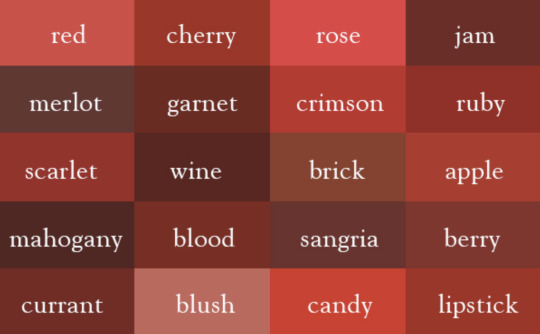
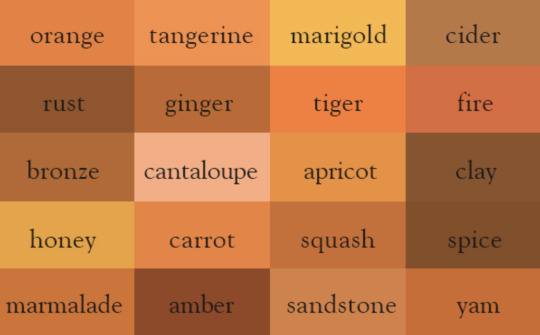
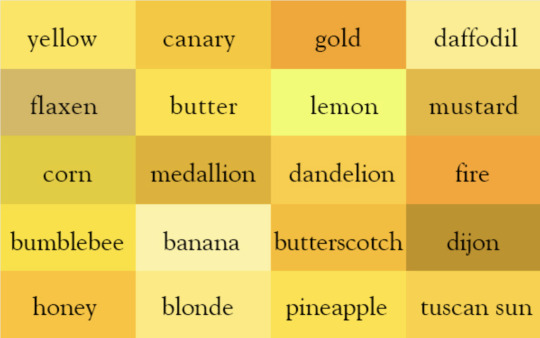
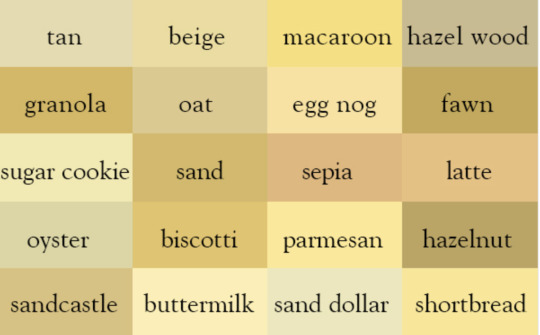
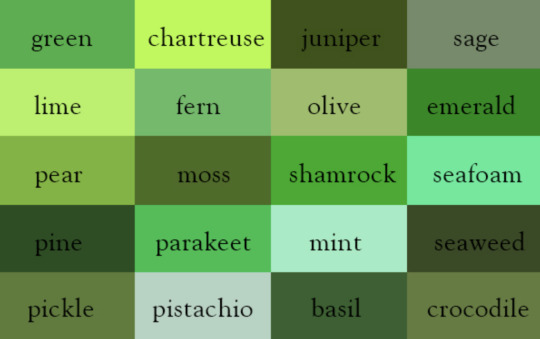
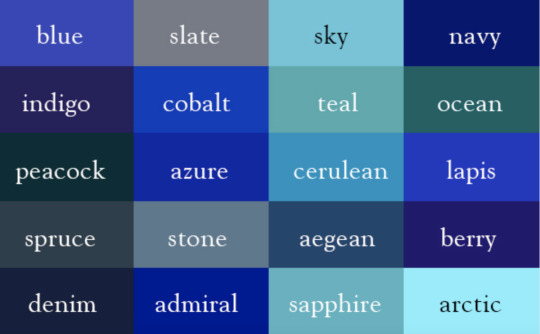
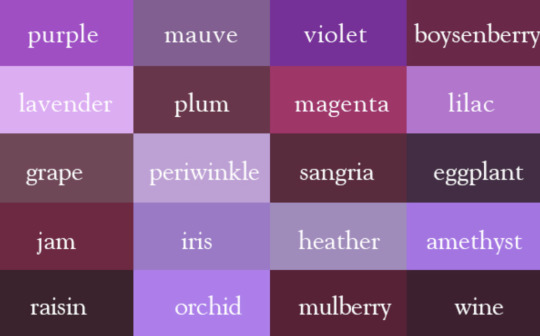
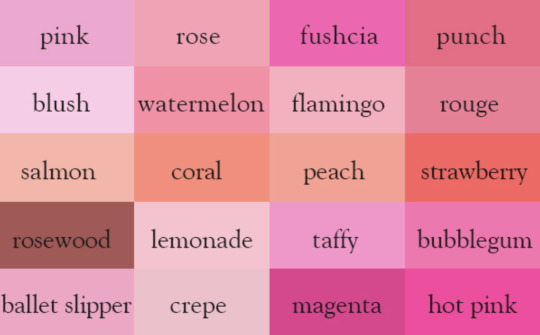
19K notes
·
View notes
Text
Words to describe facial expressions
Absent: preoccupied
Agonized: as if in pain or tormented
Alluring: attractive, in the sense of arousing desire
Appealing: attractive, in the sense of encouraging goodwill and/or interest
Beatific: blissful
Black: angry or sad, or hostile
Bleak: hopeless
Blinking: surprise, or lack of concern
Blithe: carefree, lighthearted, or heedlessly indifferent
Brooding: anxious and gloomy
Bug eyed: frightened or surprised
Chagrined: humiliated or disappointed
Cheeky: cocky, insolent
Cheerless: sad
Choleric: hot-tempered, irate
Darkly: with depressed or malevolent feelings
Deadpan: expressionless, to conceal emotion or heighten humor
Despondent: depressed or discouraged
Doleful: sad or afflicted
Dour: stern or obstinate
Dreamy: distracted by daydreaming or fantasizing
Ecstatic: delighted or entranced
Faint: cowardly, weak, or barely perceptible
Fixed: concentrated or immobile
Gazing: staring intently
Glancing: staring briefly as if curious but evasive
Glazed: expressionless due to fatigue or confusion
Grim: fatalistic or pessimistic
Grave: serious, expressing emotion due to loss or sadness
Haunted: frightened, worried, or guilty
Hopeless: depressed by a lack of encouragement or optimism
Hostile: aggressively angry, intimidating, or resistant
Hunted: tense as if worried about pursuit
Jeering: insulting or mocking
Languid: lazy or weak
Leering: sexually suggestive
Mild: easygoing
Mischievous: annoyingly or maliciously playful
Pained: affected with discomfort or pain
Peering: with curiosity or suspicion
Peeved: annoyed
Pleading: seeking apology or assistance
Quizzical: questioning or confused
Radiant: bright, happy
Sanguine: bloodthirsty, confident
Sardonic: mocking
Sour: unpleasant
Sullen: resentful
Vacant: blank or stupid looking
Wan: pale, sickly
Wary: cautious or cunning
Wide eyed: frightened or surprised
Withering: devastating
Wrathful: indignant or vengeful
Wry: twisted or crooked to express cleverness or a dark or ironic feeling
104K notes
·
View notes
Text
show, don't tell:
anticipation
- bouncing legs
- darting eyes
- breathing deeply
- useless / mindless tasks
- eyes on the clock
- checking and re-checking
frustration
- grumbling
- heavy footsteps
- hot flush
- narrowed eyes
- pointing fingers
- pacing / stomping
sadness
- eyes filling up with tears
- blinking quickly
- hiccuped breaths
- face turned away
- red / burning cheeks
- short sentences with gulps
happiness
- smiling / cheeks hurting
- animated
- chest hurts from laughing
- rapid movements
- eye contact
- quick speaking
boredom
- complaining
- sighing
- grumbling
- pacing
- leg bouncing
- picking at nails
fear
- quick heartbeat
- shaking / clammy hands
- pinching self
- tuck away
- closing eyes
- clenched hands
disappointment
- no eye contact
- hard swallow
- clenched hands
- tears, occasionally
- mhm-hmm
tiredness
- spacing out
- eyes closing
- nodding head absently
- long sighs
- no eye contact
- grim smile
confidence
- prolonged eye contact
- appreciates instead of apologizing
- active listening
- shoulders back
- micro reactions
91K notes
·
View notes
Text
traits turned sour
honest - insensitive
persuasive - manipulative
caring - overprotective
confidence - arrogance
fearless - cocky
loyalty - an excuse
devotion - obsession
agreeable - lazy
perfectionism - insatisfaction
reserved - aloof
cautious - skeptical
self loved - selfish
available - distractible
emotional - dramatic
humble - attention-seeking
diligent - imposing
dutiful - submissive
assertive - bossy
strategic - calculated
truthful - cruel
26K notes
·
View notes
Text
The best character development is when the antagonist doesn't even really change or redeem himself. Like no, he still sucks, he's just on our side now.
83K notes
·
View notes
Text
two characters who understand each other like no one else does and therefore hurt each other like no one else can
94K notes
·
View notes
Text
The best character development is when the antagonist doesn't even really change or redeem himself. Like no, he still sucks, he's just on our side now.
83K notes
·
View notes
